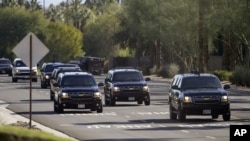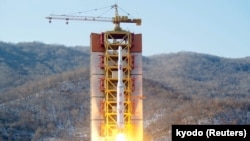U.S. President Barack Obama will seek to solidify America’s leadership role in the Asia Pacific region for many years to come when he hosts all 10 Association of Southeast Asian Nations (ASEAN) at the historic Rancho Mirage retreat in Sunnylands, California.
The agenda on Monday and Tuesday will be less formal than other summits at this picturesque and more relaxed location, but the leaders will tackle a range of critical and thorny issues central to the strategic U.S. rebalance to the Asia Pacific.
The White House views America’s engagement in the region as critical to the nation’s future prosperity and security. The dynamic and diverse region is experiencing explosive growth and rising tensions, each having the potential to impact the global economy and security.
Administration officials say by hosting the ASEAN summit, Obama hopes to develop a work plan for his final year in office to further the rebalance effort and send a message to future administrations that the same high-level of engagement is needed for the U.S. to secure and maintain its leadership role.
The plan is expected to include closer relationships on trade and commerce, increased people-to-people ties, more cooperation on countering violent extremism and the creation of rules and principles to guide nations on a range to issues.
Watch: The South China Sea Dispute
The heart of the region
The administration describes ASEAN as “the heart” of the Asia Pacific and the ideal forum to build a regional infrastructure to ensure the peaceful and legal pursuit of interests.
“The more that we can establish clear rules of the road for how issues are managed, for how disputes are resolved, the more stable and prosperous this region is going to stay going forward,” said Ben Rhodes, White House deputy national security advisor.
“Otherwise, it’s the law of the jungle. It’s one big nation bullying a smaller nation, and that’s how you lead to a cycle of conflict, which is in nobody’s interest,” he added.
Territorial disputes in the South China Sea and China’s increasing activities there will be a key discussion during the summit.
The U.S. will send “a very clear message” to ASEAN leaders that it opposes China’s “militarization” of the disputed territories and any escalation of tensions across the region, White House officials say.
It will be a delicate issue as ASEAN countries want to see a productive relationship between Washington and Beijing and are uneasy about tensions between the two super powers.
Though the U.S. is not a claimant in the South China Sea disputes, Obama is expected to make clear the U.S. will continue recent freedom of navigation operations in the same waters. The U.S. “interest in the South China Sea is the free flow of commerce, open sea lanes, and the global economy depends on it,“ Rhodes said.
Beijing says it has a long had a rightful claim to the disputed territories.
North Korea
The U.S. and ASEAN leaders will also discuss North Korea’s recent rocket testing and what role China can help play is pressuring Pyongyang to end its “provocative” actions.
While the China and the U.S. have disagreed on North Korea, the U.S. sees a common interest with China in ensuring the denuclearization of the Korean Peninsula.
"We are exceptionally candid in confronting the many differences and tensions that exist between us,” said Daniel Kritenbrink, National Security Council Senior Director for Asian Affairs.
“But our relationship with China is mature, it’s stable, it’s broad, it’s complex."
But ultimately the ASEAN summit is “not about China” says Daniel R. Russel, Assistant Secretary of State for East Asian and Pacific Affairs. Rather, it is about creating a cohesive ASEAN committed to rules and fairness.
“It allows major countries like the United States and other powers to engage constructively as partners. It prevents Southeast Asia from becoming a sphere of influence or becoming a battlefield,” said Russel.
Obama will speak for human rights and democracy, but administration officials acknowledge ASEAN countries have vastly different political models and records on human rights and democracy.
“The U.S. rule has not been to dictate the precise model that each is going to take given that they are at different stages of development,” said Rhodes. “However, we do make it a part of our engagement to support basic universal rights, to support civil society.”
Countries showing “positive movement in pursuit of a democratic transition,” like Myanmar, will get U.S. support, officials say.
Together the 10 ASEAN members make up the third-largest economy in Asia and the seventh-largest in the world, with a combined GDP of $2.4 trillion, according to the U.S. More than 65 percent of its 632-million people are below the age of 35.
The nations are evolving into economies driven more by entrepreneurship, technology and knowledge-based markets, and “these are places where the United States can really add value,” Rhodes said, by “inter-connecting innovation and entrepreneurship within our own economy and the global economy.”










